Navigation

Help Me Find a Drug Rehab Center
Types of Drug Rehabilitation
Rehabilitation is a broad term that summarizes all medical procedures and / or addiction treatment psychotherapeutic for proactive substances such as heroin, cocaine and amphetamines. The purpose of rehabilitation is to convince the addict to quit substance use specifically to avoid problems arising from the abuse of these substances.
People of all ages suffer from drug abuse: infants who were prenatally exposed to drugs, teens, adults, parents. Many people are in the social or financial circumstances making the treatment against drug addiction to be more difficult. Although some problems are common to all groups of people, addiction severity varies from person to person.
Drug addiction is a condition that can be treated because it is seen as a disease. Treatment is not universal, but must be tailored to each person in particular for it be successful. Only in this way patients can rejoice from sustainable long-term results and quit their addiction altogether.
Addiction is defined as a chronic and recurrent brain activity that is characterized by obsessive quest for drugs and their consumption. Addiction is seen as a brain disease because drugs can change brain structure as well as the way it works. Drug use can have long-lasting effects on the brain that result in dangerous behaviors which can be easily witnessed on addicts.
How are chemical drugs influence brain's activity level? Our brains are built to sustain good habits that make the body. He rewards you undertake these activities through the release of dopamine and makes us feel good. Drugs directly or indirectly affects the brain's reward system by flooding it with dopamine or serotonin and creates a feeling of euphoria. This process is specific to each type of drug. We can not achieve this kind of euphoria through any type of natural reward.
Treatment of drug addicts account for the two facets of addiction: physical and psychological addiction is. Research shows that combining medication with the behavioral treatment is the best method of rehabilitation and addiction cure.
Physical dependency involves a detoxification process to help the patient withstand adverse reactions occurring upon discontinuation of drug. Several medications can be used in certain stages of treatment to help the patient to stop using drugs and not give back this behavior.
When patients stop eating a particular drug, they may experience physical or psychological symptoms such as depression, restlessness, anxiety, restlessness, insomnia. There are some medications that can help patients to overcome these feelings.
Other drugs are used to help the patient to continue treatment. This helps the brain to gradually adapt to the absence of drug. These drugs have a calming effect on the patient him helping him to focus on behavioral treatment.
Also, there are medications that you can help the patient who has just finished the treatment to not resume his/her old habits due to stress or drug exposure. Methadone is the most common substance in the treatment of drug addiction. However, it's to be noted that moral support in the post-treatment period is also extremely important, as patients may feel an immediate need for the drug once specialized support is over.
Behavioral treatments help patients to change their attitude towards drugs and gives them the tools to better manage stressful situations in which they find every day situations that might push back the drug. Moreover, behavioral therapies increase the efficiency of drug treatment and encourages people to follow treatment for longer. Treatment usually lasts up to 3 months.
There are various types of drug rehabilitation programs which can aid in curing addiction, including residential (in-patient) treatment, local support groups, out-patient, addiction counseling, extended care centers, mental health, recovery/sober houses, medical care and ortho-molecular medicine. All these are distributed accoridng to the patient's suffering, and one option may suit some while others may be better off with another way of treatment. For instance, in-patient treatment is mostly recommended for people with not very severe addiction, while out-patient is extremely beneficial in cases of serious events.
Additionally, some rehab centers also offer gender and age-specific programs, which will best suit individuals who have adaptation problems. It's been proven that drug addicts can collaborate best with people sharing the same dependence as them, but also to those who are in their physical sphere (e.g. same age or gender). Thus, this type of treatment may yield particularly better results.
Category
- Drug and Alcohol Rehab Services
- Drug and Alcohol Rehabs
- Drug Detox / Alcohol Detoxification
- Methadone Detox
- Group Homes
- Hospital Inpatient Programs
- Outpatient Rehabs
- Partial Day Rehabs
- Residential Short-Term Rehabs (Less Than 30 Days)
- Residential Long-Term Rehabs (30 Days or More)
- Adolescent / Teen Rehab Centers
- Dual Diagnosis
- HIV / Aids Treatment Services
- LGBT Rehabs
- Senior Rehabs
- Rehabs for Expectant Mothers
- Women - Treatment Services
- Men - Substance Abuse Treatment
- Residential Beds Parents w/ Children
- Dui/Dwi Clients
- Criminal Justice Client Rehabs
- Self Pay
- Medicaid Accepted
- Medicare Accepted
- State Insurance
- Private Health Insurance
- Rehabs that Accept Tricare
- Access To Recovery Voucher
- Sliding Fee Scale Accepted
- Rehabs with Payment Assistance
- Hearing Impaired Rehab Services
- Spanish Treatment Services
- Other Languages